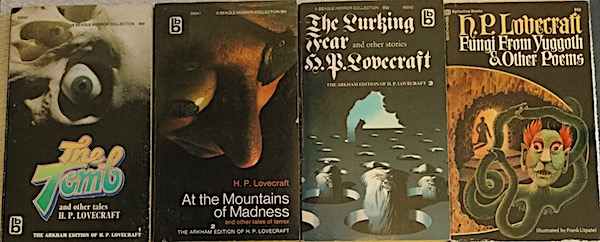Lovecraft primarily saw himself as a poet. Fiction was, for him, a sideline; something at which he made the occasional buck to supplement his meager inheritance, which he shared with two maiden aunts. Yet, the literary impact of that fiction is huge. As a poet, though, he was mostly mediocre.
The very first Lovecraft story I read was “The Colour Out Of Space”, which Groff Conklin included in his fabulously wonderful Omnibus of Science Fiction. A truly outstanding sci-fi anthology. I read “The Colour Out Of Space” sometime back in the early 1960s when I was in elementary school. And it captured my imagination.
The next time I ran into Lovecraft was in my senior year in high school when I bought the Beagle Books reprints of the Arkham edition of Lovecraft’s fiction and Ballentine’s Fungi from Yuggoth & Other Poems.
One of the first stories I read in those paperbacks was “The Lurking Fear”, which plays on the classic American gothic theme of the abhuman. The abhuman is the degenerate, bestial human. The human that has regressed to a point where he or she no longer functions as a human, but as a beast.
At that time, the theme was new to me and I was fascinated by it. Reverse evolution, as it were. But there’s also the metaphysical question of just exactly what is it that makes us human. Are we angels that are prone to sin? Or are we beasts with but a veneer, a mask, of civility?
In Terror in the Shadows, I explore the abhuman theme by building on Lovecraft’s story. And I give one possible explanation for why the abhuman might come into existence. I’ll give you a hint: it doesn’t have anything to do with a mother’s love, or lack thereof.
There is a wide range of opinion as to Lovecraft’s storytelling ability. There are those who place him second to Poe. There are those who think he wrote drivel. I’m somewhere in the middle. When Lovecraft was firing on all cylinders, he knocked the ball out of the park. The problem is, he didn’t always fire on all cylinders. In fact, a lot of the time he didn’t. He was quite inconsistent as a writer.
From early on, I maintained that Robert E Howard was consistently a better writer than Lovecraft. But when Lovecraft was on top of his game, he was second to none. That’s why I think Lovecraft developed such a devoted following. Other writers saw his rare genius and also saw him as an approachable person, which allowed Lovecraft to share his opinions with other writers and hopeful writers. HPL was one of the 20th Century’s great epistolarians.
I appreciate Lovecraft from the perspective of a reader as well as from the perspective of a writer. Possibly his single most important contribution to the craft of writing is his emphasis on atmosphere. When reading one of Lovecraft’s stories, one cannot escape the mood, the feelings, the details, the colors that all lead to a general feeling of dread. For Lovecraft, the atmosphere was everything. Without it, the tale of terror would be nothing.
But atmosphere is important in all genres of fiction, because it sets the scene. It lets us know what we see and touch and taste and smell. The atmosphere instills in us a general feeling, whether of happiness or terror, joy or dread. Whenever a writer can create an atmosphere that lets me see and touch and smell, I thank Lovecraft.
If character is king in storytelling, then atmosphere has to be the queen.
HP Lovecraft was a literary giant who produced but few gems. But the ones he did produce blind us with their light. I think I’ll stop now and go read once again “The Colour Out of Space” — the story that for me started it all.
Comments are always welcome, and, until next time, happy reading!
Share This!
One thought on “HP Lovecraft — His Influence”
Comments are closed.